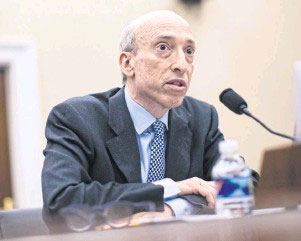SEC Closes In on Rules That Could Shift Stock Market
Chairman Gary Gensler is expected to outline ideas for improving market efficiency today
PUBLISHED : 8 JUN 2022 AT 08:03

SEC chairman Gary Gensler’s plans have drawn opposition from some Wall Street firms.
The Securities and Exchange Commission is preparing to propose major changes to the stock market’s plumbing as soon as this fall. Chairman Gary Gensler directed SEC staff last year to explore ways to make the stock market more efficient for small investors and public companies.
While aspects of the effort are in varying stages of development, one idea that has gained traction is to require brokerages to send most individual investors’ orders to be routed into auctions where trading firms compete to execute them, people familiar with the matter said.
SEC staffers have begun floating plans with market participants in recent weeks, and Mr. Gensler is planning to detail some of the potential changes in a speech today, these people added.
The most consequential change being discussed would affect the way trades are handled after an investor places a so-called market order with a broker to buy or sell a stock.
Market orders, which account for the majority of individual investors’ trades, don’t specify a minimum or maximum price the investor is willing to pay.
Mr. Gensler has said he wants to ensure that brokers execute orders at the best possible price for investors — the highest price for when an investor is selling, or the lowest price if they are buying.
Current rules require brokers to perform “reasonable diligence” to determine the likely best market for executing a trade.
Many brokers route orders to big electronic trading firms called wholesalers, including Citadel Securities or Virtu Financial Inc., rather than to exchanges such as the Nasdaq Stock Market, arguing that the wholesalers provide the best prices.
Some brokers, including Charles Schwab Corp. and Robinhood Markets Inc., accept compensation from wholesalers for routing trades to their venues.
Mr. Gensler has said this practice, known as payment for order flow, creates a conflict of interest and limits competition for individual orders.
Under the auctions being considered by the SEC, different firms would compete with each other to fill an individual
investor’s trade, according to people familiar with the agency’s plans.
Such a mechanism would fundamentally alter the business model of wholesalers, which can make more money by trading against small investors than they do on public exchanges, where they might find themselves trading with other sophisticated trading firms or institutional investors.
An SEC spokesman declined to comment.
A number of Wall Street firms pushed back forcefully last year when it became apparent that Mr. Gensler was targeting their business models.
Wholesalers and brokers ramped up their lobbying and campaign spending in Washington and published their own plans for improving the stock market.
Virtu and Citadel Securities, in particular, have argued against the sort of changes the SEC is considering. They say the current system, including payment for order flow, has underpinned a broad reduction to trading costs that has made the stock market more accessible.
Douglas Cifu, chief executive of Virtu, said the order-by-order competition sought by Mr. Gensler could allow trading firms more discretion in choosing which trades they fill.
This could end up being more profitable in the short term for wholesalers, he said, but wouldn’t necessarily help investors.
“The SEC should engage all market participants before proposing significant untested changes that would harm retail investors’ execution quality and reduce retail investors’ access to our capital markets,” Mr. Cifu said.
A spokesman for Citadel Securities said the firm looks forward to reviewing the SEC’s proposals and working with the agency.
“It is important to recognize that the current market structure has resulted in tighter spreads, greater transparency and meaningfully reduced costs for retail investors,” the spokesman added.
The SEC commenced its review of market structure after the frenzied trading in GameStop Corp. and other meme stocks in early 2021 brought fresh scrutiny to the handling of individual investors’ trades.
After a year of internal deliberations, the agency has homed in on a narrowing set of proposals.
If the SEC votes to release them for public comment later this year, they would have a path to implementation, as Democrats hold a majority of seats on the commission.
The agency is also considering creating a more-stringent version of the socalled best-execution rule that directs brokers to find the most favorable terms for their customers, two of the people said.
The rule that brokers currently follow was written by the Financial Industry Regulatory Authority, an industry body overseen by the SEC.
The SEC is also weighing a proposal to allow stock exchanges to quote shares in increments of less than one cent.
This could enable venues such as Nasdaq or the New York Stock Exchange to better compete with wholesalers, which can beat the prices publicly displayed on exchanges by adding or subtracting hundredths of a penny to the price of a stock.
Two people familiar with the matter said the agency is also considering an idea to harmonize the price increments, known as tick sizes, that are available on exchanges versus other venues.
In addition, SEC officials are aiming to reduce the maximum fee that exchanges can charge brokers to access their quotes, two of the people said.
Like some of the other changes under consideration, such a move could encourage more orders to be sent to exchanges rather than to other venues.

























